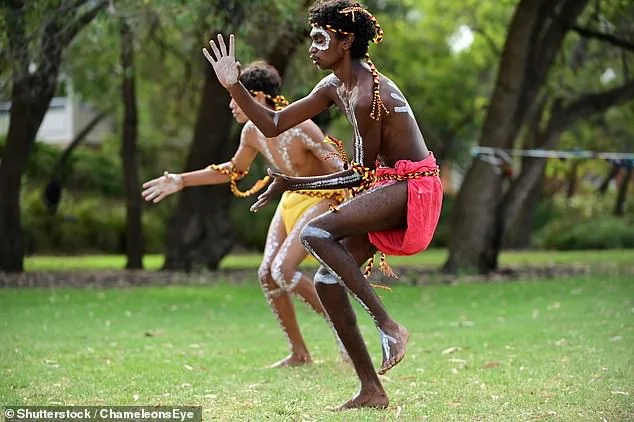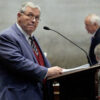Megan Davis: Video surfaces of Voice architect saying the Uluru Statement from the Heart is about ‘Voice first, Treaty second’ and warning ‘treaties are about reparations’
The Voice referendum campaign has been rocked by the resurfaced video of a Voice architect declaring the Uluru Statement from the Heart is about ‘Voice first, Treaty second’.
In a speech she gave on June 28, 2018, Professor Megan Davis also said ‘treaties are about reparations’ and that ‘Treaty is not an end, it’s a beginning.’
Prof Davis’ resurfaced video comes just days after it was revealed fellow Voice architect Pat Anderson said the advisory body would ‘share power with parliament’ following a successful Yes vote.
‘Uluru was a sequence reform. Voice to the Parliament first, Treaty second,’ Prof Davis said.
‘Treaties are legal texts. There will be disputes over interpretation. The treaties are about reparations for past injustices and they are about land and they are about resources.’

The Uluru Statement from the Heart was delivered in May 2017, after two years of deliberative ‘dialogues’ with Indigenous communities across the country.
It underpins the upcoming referendum to be held on October 14, which, if passed, would enshrine an Indigenous Voice in the Australian Constitution.
This would mean an advisory body of First Nations people must be consulted by federal politicians on matters affecting Aboriginal and Torres Strait Islander people.
Australia’s Prime Minister, Anthony Albanese, has consistently said the referendum – which polling has indicated will fail – is only about a Voice, not a Treaty or reparations.
But Mr Albanese was voted into office after campaigning under the slogan ‘Voice, Treaty, Truth’ and even vowed to enact the Uluru Statement from the Heart ‘in full’ in his first speech after winning power.
Prof Davis said during her address getting a ‘Treaty has always been the primary aspiration of the Aboriginal and Torres Strait Islander movement’.
‘The Treaty is a foundational constitutional agreement between First Nations and the state and they do involve a redistribution of political power.’
She said a Treaty would lead to ‘binding frameworks of future engagements and dispute resolution’ but that ‘there will be disputes over interpretation’.

The UNSW professor also spoke about the Makarrata Commission, which would seek a treaty between the federal Government and the First Nations community.
‘The idea behind this Makarrata Commission is that we can gather resources, so precedence is really important to capture how it is that Victoria has got to this point.’
Victoria’s Yoorrook Justice Commission was set up to ‘address historic and ongoing injustices and form a key part of the treaty process’.
Prof Davis said ‘Every single element, every single person needs to be interviewed, so that everybody who is involved in this in the future across the country can draw on that.’
She also spoke in her speech about the ‘very important fast-tracking of land settlement, including native title’.
‘Treaty is not an end, it’s a beginning. The Voice to Parliament is not an original idea, it is as old as the calls for treaties,’ she said.
‘Aboriginal peoples as an extreme minority have always sought an enhanced role in decision making in Australian democracy.
‘So the sequence of Voice and then treaty is an appropriate one. We need an interface between communities and the state.’

The academic said to succeed, ‘an institutional framework with resources and legitimacy’ is needed.
‘Though a treaty is the primary aspiration of most Aboriginal and Torres Strait Islander people, she said, ‘a Voice also speaks to the state’s routine failure to hear what it is that we’re saying …
‘And that is what I believe Uluru represents, that is what I believe the Victorian process represents. It represents the hope against hope that we could push for a comprehensive settlement, a Makarrata process finally.
‘Voice, treaty and truth.’
Daily Mail Australia has contacted Prof Davis and the Uluru Dialogues for comment.


